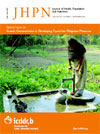
|
The Journal of Health, Population and Nutrition
icddr,b
ISSN: 1606-0997
EISSN: 1606-0997
Vol. 26, No. 2, 2008, pp. 210-222
|
 Bioline Code: hn08023
Bioline Code: hn08023
Full paper language: English
Document type: Research Article
Document available free of charge
|
|
|
The Journal of Health, Population and Nutrition, Vol. 26, No. 2, 2008, pp. 210-222
| en |
Training in Complementary Feeding Counselling of Healthcare Workers and Its Influence on Maternal Behaviours and Child Growth: A Clusterrandomized Controlled Trial in Lahore, Pakistan
Zaman, Shakila; Ashraf, Rifat N. & Martines, José
Abstract
Malnutrition is common among children aged 6-24 months in developing countries. It increases the risk of mortality. Interventions to improve infant-feeding hold the promise of reducing malnutrition among these children. A study in Brazil has shown the success of training in communication and counselling skills among health workers in improving the nutritional status of young children. Questions were raised whether the method used in the study in Brazil would also be effective when applied in other countries. The aim of the present study was to reduce growth faltering in young children through proper nutritionpromotion techniques. The objective of the study was to determine the efficacy of training health workers in nutrition counselling in enhancing their communication skills and performance, improving feeding practices, and reducing growth faltering in children aged 6-24 months. A cluster-randomized controlled trial was carried out. The method used in this study was a replica of the method in a similar study in Pelotas, Brazil. Forty health centres were paired, and one centre of each pair was randomly allocated to the intervention group, and the other to the control group. The Integrated Management of Childhood Illness (IMCI) module-'Counsel the mother'-was used for training health workers in the health centres in the intervention group. Data from 36 paired health centres and 375 mothers and their children aged 6-24 months recruited from these health centres following consultation with health workers were included in analysis. Independent observers, masked to the intervention status, examined the performance of health workers within the first month after training. Mother-child pairs were visited at home within two weeks, 45 days, and 180 days after recruitment. Information was recorded on the feeding practices, recall of the recommendations of health workers, and sociodemographic variables at these home-visits. Weight and length of the child were measured at each contact. The communication skills and consultation performance of health workers were significantly better in the intervention group than in the control group. The mothers' recall of the recommendation of health workers and reported infant-feeding practices were also significantly better in the intervention group than in the control group, even 180 days after the recruitment consultation. Growth faltering was less in the intervention group, with the largest effect observed among children in the age-group of 12 + months. These results indicate that training in IMCI feeding counselling can enhance the communication skills and performance of health workers. Improved feeding practices of counselled mothers can, in turn, reduce growth faltering in their children.
Keywords
Child; Child-feeding practices; Child growth; Child nutrition disorders; IMCI; Impact studies; Infant; Infant growth; Infant nutrition disorders; Nutrition counselling; Randomized controlled trials; Training; Pakistan
|
| |
© Copyright 2008 - International Centre For Diarrhoeal Disease Research, Bangladesh
Alternative site location: http://www.jhpn.net
|
|
